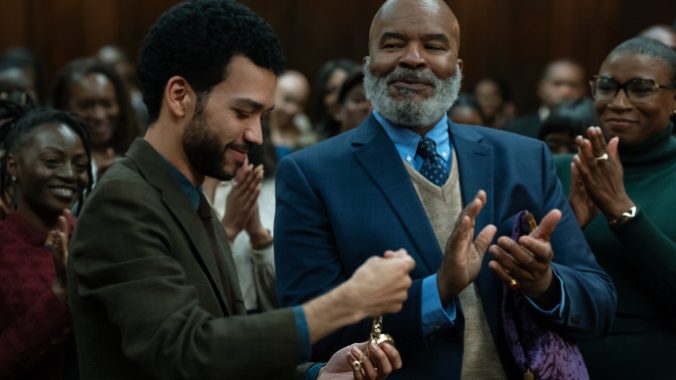One-Joke Satire The American Society of Magical Negroes Is a Middling Stand-Up Bit

Like any other form, satire is truly spectacular when it is solidly grounded in the world it is trying to critique. The challenge of a film like The American Society of Magical Negroes is that the joke rarely goes beyond the single line premise for the movie, missing the opportunity to offer a biting analysis. Then again, that could also be a sign of the current times we live in, where a level of exhaustion has crept into debates that truly engage in political discourse. It can’t be denied, however, that a level of ennui starts to creep in while watching writer/director Kobi Libii’s debut.
The American Society of Magical Negroes opens at a gallery, where Aren’s (Justice Smith) yarn sculpture is part of an artist showcase. However, Aren is also a diffident artist, unable to muster the wherewithal to actually sell his artwork, even when specifically instructed to do so. Aren leaves the show dejected, and soon after is mistaken for being a mugger because he just cannot take up space.
Fortunately, Roger (David Alan Grier), whom we’d earlier seen bartending at the art gallery event, has followed Aren and saves him. Roger also thinks Aren is the perfect candidate to become a member of a secretive group. The goal of the group? To make white people feel more comfortable, and avoid the potential for disastrous outcomes.
A little reluctant at first, Aren does need a job. He’s paired off with Jason (Drew Tarver), a designer at a tech company called Meetbox. Meanwhile, after a meet-cute at a cafe, Aren is drawn to coworker Lizzy (An-Li Bogan). But so is Jason. To make matters worse—after facing backlash over Meetbox’s facial recognition software failing to recognize Black people—Aren, Jason and Lizzy need to work together on a project to address the controversy.
People familiar with film history will immediately clue into the fact that the movie is directly referencing a term attributed to Spike Lee—the “magical negro,” a racist trope used by many Hollywood movies where a Black character simply acts as a guide for the white lead’s narrative arc. Think of movies like The Legend of Bagger Vance or The Green Mile, both of which are caricatured in Libii’s film. Of course, the list of movies in which Black characters serve as props for white character development and/or redemption is much longer.
-

-

-

-

-

-

-

-

-

-

-

-

-

-

-

-

-

-

-

-

-

-

-

-

-

-

-

-

-

-

-

-

-

-

-

-

-

-

-

-








































